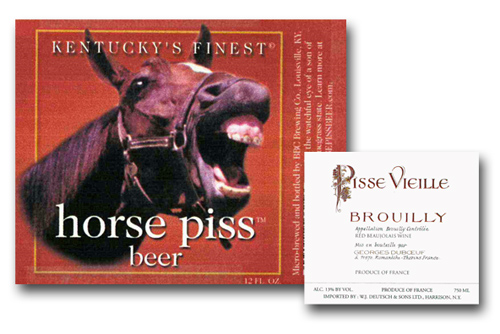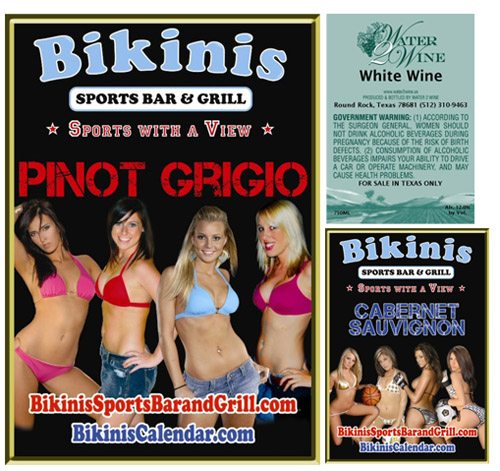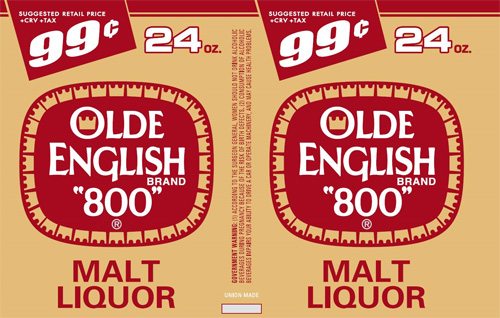Does anyone else thinks that’s a lot of beer for just a dollar? It’s twice the size of a typical 12 ounce can, and if it’s anywhere close to 8% alc./vol. it’s twice again. So it’s the equivalent of four beers, at something like a quarter apiece. Is this normal, or a sign of the rough economy? We also wanted to post this because it’s a rare label that posts the price right on the permanent package. And somehow we think it will not be long until essentially all alcohol beverage labels post the alcohol content, in a clear way, and this does not.
Continue Reading Leave a Commentbusiness strategy
Pee Like a Racehorse (or an Old Woman)

Is it a good old word or a bad one? Well it’s certainly an old word. The Online Etymology Dictionary says it goes back to around 1290:
piss (v.) … c.1290, from O.Fr. pissier “urinate” (12c.), from V.L. *pissiare, of imitative origin. As a pure intensifier (cf. piss-poor, piss-ugly, etc.) it dates from World War II. Pissed off “angry, fed up” is 1946, U.S. slang. To piss off “go away” is attested from 1958, chiefly British. Piss and vinegar first attested 1942. Piss-prophet “one who diagnosed diseases by inspection of urine” is attested from 1625. Piss proud “erect upon awakening” is attested from 1796.
It pops up fairly often on beer and wine labels. Above is Horse Piss Beer, made in Louisville, Kentucky. Another beer along these lines is Piss Brand Beer, made in Australia. And then there is Pisse Vieille wine, from Beaujolais. Wiki explains the name thusly:
Continue Reading Leave a CommentThe Brouilly cru also contains the famous Pisse Vieille vineyard (roughly translated as “piss old woman!”) which received it name from a local legend of a devout Catholic woman who misheard the local priest’s absolution to “Allez! Et ne péchez plus.” (Go! And sin no more.) as “Allez! Et ne pissez plus.” (Go! And piss no more). The vineyard name is...
Tags: business strategy, risqué, would you approve it?, would you drink it?, writing/witty/funny
Diamonds, Gold & Vodka: What Recession?

One is filtered through diamonds and the other has gold flakes in the bottle. Double Cross Vodka is made in the Slovak Republic, where it is “filtered with diamond dust.” The small red strip label says so. Thanks to The Intoxicologist and Emily Haile for bringing this to our attention. Luxist explains:
The seven-times-distilled spirit uses only 100 percent organic, estate-grown winter wheat and mountain spring water drawn from aquifers located 200-feet below ground level. Double Cross’ diamond dust filtration system is said to provide unprecedented filtration capability because of the “unique shape and sub-micron size of the diamond dust particles.”
Rather than filter through the costly substance and leave it at the distillery, Gold Flakes Vodka puts the 24 karat gold right in each bottle. Luxist says it will retail for about $60 per bottle.
Continue Reading Leave a CommentTags: business strategy, ingredients, processing
Hello Kitty Wine

A lot of labels on this blog speak to men. This one speaks loudly to women. Above are two of four Hello Kitty table wines imported from Italy by USA Wine Imports of New York, NY. Wiki says Hello Kitty is:
one of many simply drawn fictional characters produced by the Japanese company Sanrio. Designed by Ikuko Shimizu, the first product, a vinyl coin purse, was introduced in Japan in 1974, and in the United States in 1976. … The Hello Kitty line has since developed licensing arrangements worth more than $1 billion a year in sales. Examples of products depicting the character include dolls, stickers and greeting cards to clothes, accessories, school supplies, dishes and home appliances.
This might be good for Valentine’s Day. Sanrio has licensed an awful lot of Hello Kitty products, and who would not enjoy a Saturday afternoon flaunting their Hello Kitty Lawnmower?
Continue Reading Leave a CommentTags: business strategy, famous, narrowed demographic, trademarks-beverage
Water 2 Wine

Water 2 Wine caught our eye. Because there are an enormous number of label approvals. Water 2 Wine has more than 1,500 label approvals since 2004. Why so many? It turns out that Water 2 Wine runs franchised mini-wineries in nine cities around Texas, with one in California and one more in Colorado. The website explains:
Water 2 Wine is the Ultimate Wine Experience! Juice (or “must”), is made available from more than 100 vineyards in 12 countries, and is made into wine in our custom winery! The wine is sold by the glass, by the bottle and by the batch (approx. 28-30 bottles). Wine sold by the batch is made by customers, who return about 45 days later to bottle, cork, and custom label their wine with a label we help them create! All wines contain only minimal amounts of sulfites and no histamines and are available for tasting before purchasing.
It further explains the business and legal side:
Continue Reading Leave a CommentThe Franchise Fee for your first Water 2 Wine will be $35,000. This fee is part of the total initial investment and includes up to 3 weeks training at the franchise training center in Austin, TX. … There is a mandatory $5,000 Licensing Assistance Fee. The path to Federal and State licensing can...
Tags: business strategy, design, sexual
Champagne Battle Spills into Time Magazine

We never thought we’d see a TTB controversy make it into a big ad in the national media — let alone a full page ad in Time Magazine. The yellow ad is on page 69 of the December 29, 2008 “Person of the Year” double issue and it covers the entire page. The French Office of Champagne is not at all pleased that some non-French wines qualify to be called Champagne, under US law. The ad says “Masquerading as Champagne … isn’t fair. … A legal loophole allows” some names to be misused. In 2006, after many years of negotiations between the US and the European Union, and agreement, TTB set forth the current US rule in TTB Industry Circular 2006-1:
Continue Reading Leave a Commentthe U.S. made a commitment to seek to change the legal status of [terms like Champagne] to restrict their use solely to wines originating in the applicable EU member state, with certain exceptions. Because the IRC specifically defines semi-generic names, this law must be changed in order to restrict the usage of the names to wines originating in the EU. Assuming the law is so changed, the Agreement contains an exception to this rule. We refer to this exception as the “grandfather” provision. Under the “grandfather” provision, any person or his or her successor...
Tags: ad, business strategy, international, legally interesting/controversial, origin, policy


